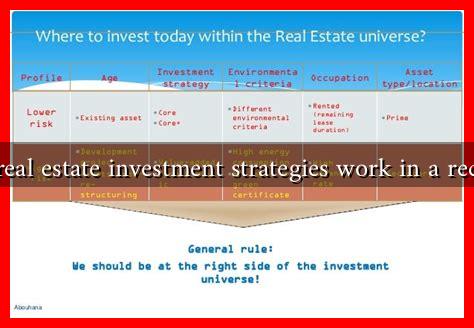-
Table of Contents
What Real Estate Investment Strategies Work in a Recession?
Real estate investment can be a lucrative venture, but it often comes with its own set of challenges, especially during economic downturns. A recession can lead to decreased property values, higher vacancy rates, and tighter lending conditions. However, savvy investors can still find opportunities in these challenging times. This article explores effective real estate investment strategies that can thrive during a recession.
Understanding the Recession Landscape
Before diving into specific strategies, it’s essential to understand the economic landscape during a recession. Typically, a recession is characterized by:
- Decreased consumer spending
- Higher unemployment rates
- Lower demand for housing
- Increased foreclosures and distressed properties
These factors can create both challenges and opportunities for real estate investors. By adapting to the changing market conditions, investors can position themselves for success.
1. Focus on Cash Flow Properties
During a recession, cash flow becomes king. Properties that generate consistent rental income can provide a buffer against market volatility. Here are some types of cash flow properties to consider:
- Multi-family Units: Apartments and duplexes often remain in demand, even during economic downturns, as people seek affordable housing options.
- Commercial Properties: Look for properties with long-term leases from stable tenants, such as essential services (grocery stores, pharmacies).
- Short-term Rentals: In tourist areas, short-term rentals can still perform well if managed effectively, especially if they cater to budget-conscious travelers.
For example, during the 2008 financial crisis, many investors shifted their focus to multi-family properties, which provided steady cash flow despite the overall market decline.
2. Invest in Distressed Properties
Recessions often lead to an increase in distressed properties, including foreclosures and short sales. These properties can be purchased at a significant discount, allowing investors to build equity quickly. Here’s how to approach this strategy:
- Research Local Markets: Identify neighborhoods with high foreclosure rates and assess the potential for appreciation.
- Evaluate Repair Costs: Be prepared to invest in renovations to bring the property up to market standards.
- Consider Wholesaling: If you lack the capital for renovations, consider wholesaling distressed properties to other investors.
According to a report by RealtyTrac, in 2020, the number of foreclosures increased by 57% compared to the previous year, presenting opportunities for investors willing to take on the risk.
3. Diversify Your Portfolio
Diversification is a crucial strategy during a recession. By spreading investments across different types of properties and locations, investors can mitigate risks. Consider the following:
- Residential vs. Commercial: Balance your portfolio with both residential and commercial properties to reduce exposure to market fluctuations.
- Geographic Diversification: Invest in different markets to take advantage of varying economic conditions.
- Asset Classes: Explore alternative asset classes such as REITs (Real Estate Investment Trusts) or crowdfunding platforms.
For instance, during the COVID-19 pandemic, some investors found success in industrial real estate, which saw increased demand due to the rise of e-commerce.
4. Build Strong Relationships
Networking is vital in real estate, especially during a recession. Building relationships with local real estate agents, lenders, and other investors can provide valuable insights and opportunities. Here’s how to strengthen your network:
- Attend Local Real Estate Meetups: Engage with other investors to share knowledge and resources.
- Join Online Forums: Participate in online communities focused on real estate investing.
- Collaborate with Professionals: Work with real estate agents and property managers who have experience in recession-proof strategies.
Conclusion
While recessions present unique challenges for real estate investors, they also offer opportunities for those willing to adapt their strategies. By focusing on cash flow properties, investing in distressed assets, diversifying portfolios, and building strong relationships, investors can navigate the turbulent waters of a recession successfully. Remember, the key to thriving in any economic climate is to stay informed, be flexible, and seize opportunities as they arise.
For more insights on real estate investing, consider visiting Investopedia.


